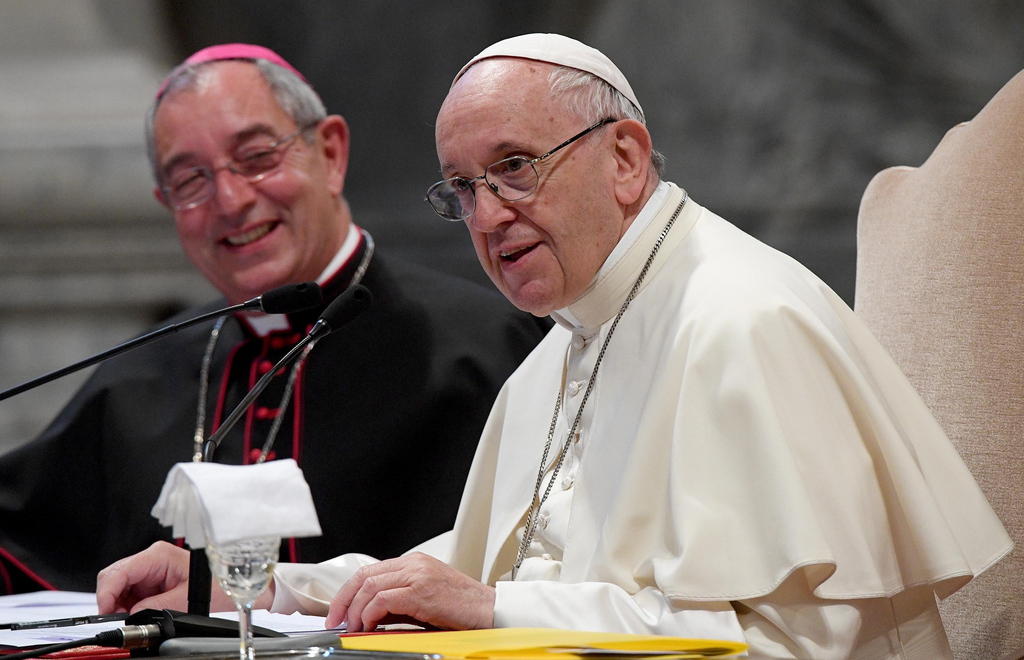
Why is the pope visiting the Geneva-based World Council of Churches?

Pope Francis is making a rare one-day visit to Geneva on June 21, where he is set to meet the Swiss president and hold a mass at the airport. But before that he’s going to the World Council of Churches (WCC) for talks. Why is he visiting this little-known religious body?
The last papal visit to Switzerland was in 2004, when Pope John Paul II came to Bern a year before he died. John Paul II had previously visited various international organisations in Geneva – aka the Protestant Rome – in 1984, including the WCCExternal link. Paul VI also went there in 1969.
Pope fever is mounting at the Geneva-based organisation, which is celebrating its 70th anniversary this year. Next month’s papal trip, which goes under the motto ‘Walking, praying and working together’, is the result of five years’ efforts by WCC officials following Pope Francis’ appointment in 2013.
“The visit of his Holiness Pope Francis on this ecumenical pilgrimage to the WCC on our 70th anniversary is a historical milestone in the search for Christian unity and for the cooperation among the churches for a world with peace and justice,” an excited Olav Fykse Tveit, WCC general secretary, told reporters on Tuesday.
Founded in 1948, the discreet religious organization brings together the world’s Orthodox, Anglican, Methodist, Baptist, Lutheran and Reformed churches – 350 member churches in all – but not the Roman Catholic Church, with whom it has had a complicated relationship.
+ More on pope’s visit to Geneva on June 21
Like the United Nations, the WCC was created after the two World Wars in the hope that Christians could put aside their doctrinal differences and help build a new world. The organisation, which has around 100 staff in Geneva, says it focuses on “strengthening relationships with member churches and ecumenical partners, spiritual life, youth engagement, inter-religious dialogue and cooperation and building a just community of women and men”.
The Roman Catholic Church decided not to join the WCC when it was set up, nor later in the 1960s when the issue of Christian unity was debated and the two bodies moved closer together.
Andrzej Choromanski, a representative of the Pontifical Council for Promoting Christian Unity, said the decision not to join was taken for “theological and practical reasons” and it remains off the cards.
“The Catholic Church is one universal global church with 1.2 billion members, whilst the WCC represents 500 million. It’d need to rethink its organisation and decision-making if the Catholic Church were to join,” he told reporters.
Despite not being affiliated, the Vatican sends around 50 observers to participate in WCC committees dealing with issues such as peace promotion, migrants and refugees, religious doctrine and education.
Highly significant
Michel Grandjean, professor of Christian history at Geneva UniversityExternal link, said the pope’s trip to Geneva was not a symbolic birthday celebration but a highly significant working visit. He added that it comes at a time when ecumenical issues need a boost.
“I think there are many issues to be discussed such as how these federations of churches are organized,” he told swissinfo.ch. “Also, there are points of understanding to be discussed. The Roman Catholic Church still refers to itself as ‘the church’ in the singular, as if it is the one authentic body while the others are tainted with suspicion; they are not seen as churches but simply ecclesiastic communities.”
Despite religious differences, the organisers say the papal visit to Geneva sends an important sign of unity.
“The Holy Father invests a great deal for Christians and tells us that we should promote a way of thinking together,” said Choromanski.
Geneva will be the second European visit by Francis with a clear ecumenical accent after his visit to Lund in Sweden in October 2016 to mark the 500th anniversary of the Protestant Reformation alongside leaders of the Lutheran World Federation.

In compliance with the JTI standards
More: SWI swissinfo.ch certified by the Journalism Trust Initiative
















![The four-metre-long painting "Sonntag der Bergbauern" [Sunday of the Mountain Farmers, 1923-24/26] had to be removed by a crane from the German Chancellery in Berlin for the exhibition in Bern.](https://www.swissinfo.ch/content/wp-content/uploads/sites/13/2025/12/01_Pressebild_KirchnerxKirchner.jpg?ver=917ecbf2)















You can find an overview of ongoing debates with our journalists here . Please join us!
If you want to start a conversation about a topic raised in this article or want to report factual errors, email us at english@swissinfo.ch.